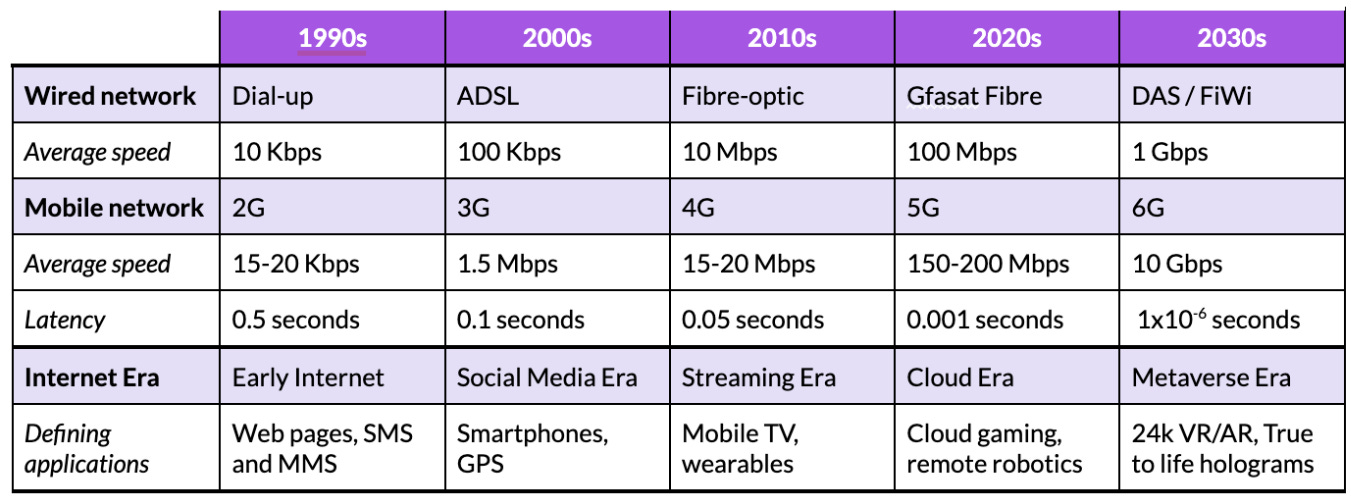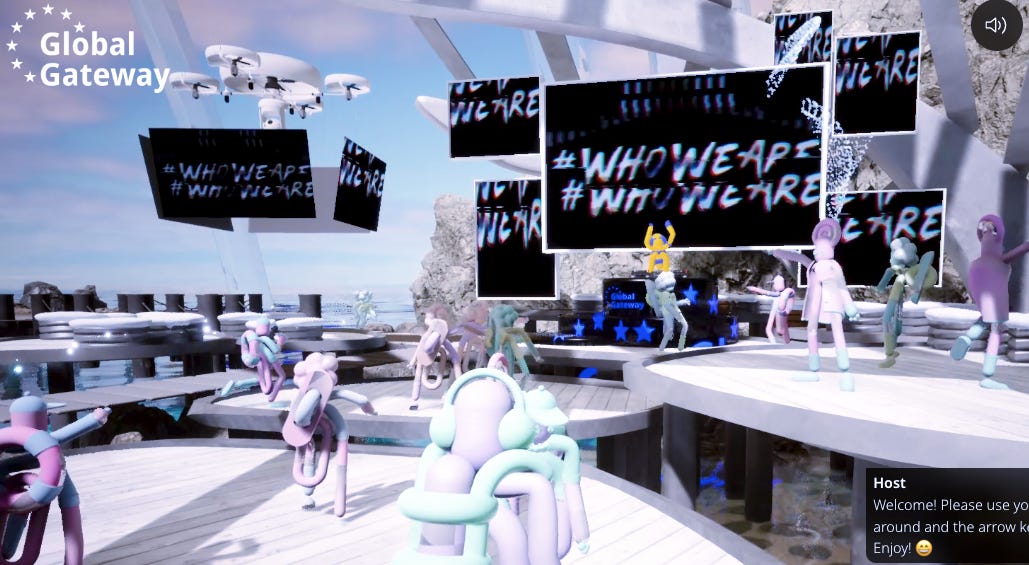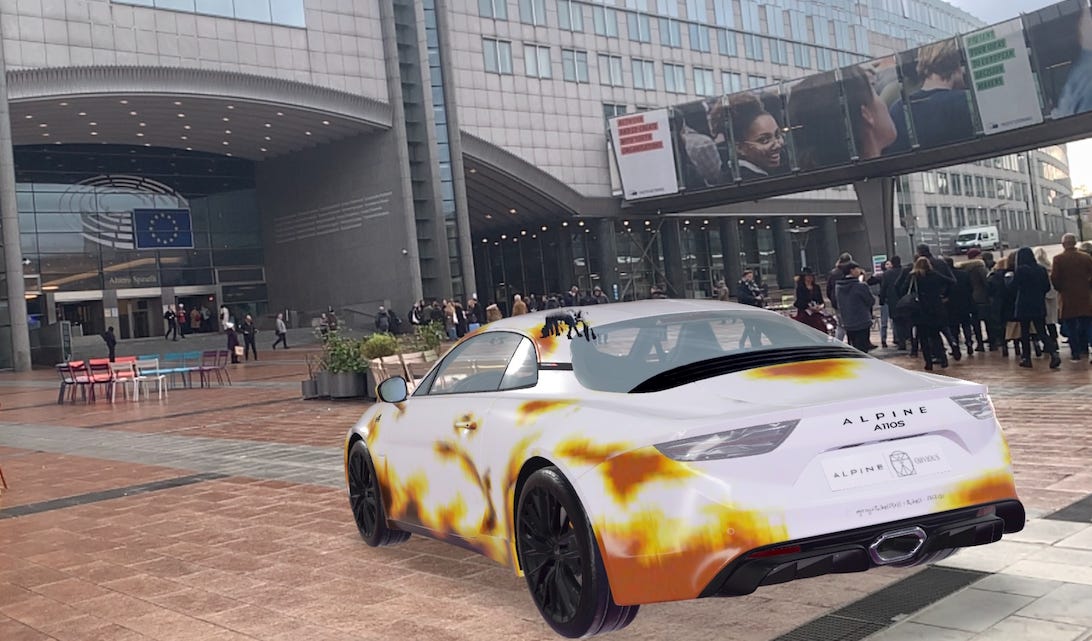Hello and welcome to Metaverse.EU, a monthly newsletter covering metaverse policy, politics and business in the EU.
Connecting the metaverse
Our experience of the internet depends upon the speedy flow of data—how much can be sent at once (bandwidth) and how far it must travel (latency). These factors determine how quickly a screen loads, how delayed a stream lags, and how often your internet drops. What will be needed for the next iteration of the internet?
Bandwidth
The metaverse will be realised by massive virtual worlds. The promise of taking school children to Ancient Rome is better imagined with a city of realistic and real-time characters and architecture, than a static cartoon environment with bobbing, legless avatars.
But the former requires much more data to flow. Take Microsoft’s flight simulator, a colossal digital twin of Earth. It is furnished with over 2 million cities and towns, 1.5 billion buildings, and 2 trillion trees—totalling 2,500,000 gigabits of data. Since no consumer device can store this data locally, the game must be streamed and rendered on the cloud. Metaverse-grade experiences will require [specify i.e. 1Gbps], the EU is currently [specify].
Latency
Gamers will know all too well the phenomenon of “lag”, where even minor increases in latency can stop-start the experience and frustrate users to the point of quitting. Video conferencing screen freezes, now familiar to all, occur at [X level] and drop-outs are similarly taxing.
A metaverse that can be enjoyed synchronously, with a compelling sense of presence, will require substantial reductions in latency. Wearables with tactile feedback will feel more real and holographic communications more persuasive with latencies of X-Y (far below current). Remote surgery will mandate minimum standards.
The future is mobile
It’s easy to forget just how exciting 2G (second-generation) mobile internet was. We could send text messages (SMS), and media messages (MMS), and enjoy quality voice calls. The evolution to 3G made possible social media and video conferencing. 4G brought about streaming-on-the-go and consistently outcompetes wired broadband. 5G will enable proto-metaverse applications, such as cloud gaming. True metaverse-grade applications will require further iterations.
The progress is vast: A film that might have taken 8 hours to download with 2G, would take 2 hours with 3G, 10 minutes with 4G, and under a second with 5G.
To this end, the European Commission’s Digital Policy Programme Directive is targeting access for all EU citizens to gigabit speeds by 2030, and 100% coverage of 5G in populated areas. Meanwhile, Meta has also launched several industry initiatives to build up digital connectivity, including a collaboration with Telefonica to invest in Spain’s infrastructure.
Data and estimates from Huawei, RantCell, FutureTimeline, Plusnet, Commsbrief, Intel, WorldWideSupply, GWSmedia.
Into the EU metaverse…
Policy
Scoping risks. The European Parliament 🇪🇺 authorised the Internal Market and Consumer Protection Committee (IMCO) to produce a report on "Virtual worlds: opportunities, risks and policy implications for the Single Market."
Wisdom of the crowd. The European Commission 🇪🇺 has commissioned Missions Publiques 🇫🇷 to run a citizen’s panel in 2023 on the metaverse.
Plenary attendance. Only five people showed up to a party hosted on the Commission’s 🇪🇺 Global Gateway metaverse platform.
Post reality. Friends of Europe 🇪🇺 warn of unprecedented risks of disinformation in the metaverse.
Tenure. Meta announced a $2.5 million investment in academic research across Europe 🇪🇺 to study the risks and opportunities of the metaverse
BitKom 🇩🇪 released a guidebook to the metaverse which overviews the state of the metaverse, the big players, legal issues, and predictions for the next 10 years.
72% of French 🇫🇷 respondents said the government needs to heavily regulate the metaverse, according to a recent report by Global Counsel.
The party goes on over at Global Gateway
Business
Putting the Meta in metaverse. Nick Clegg, Meta’s President of Global Affairs, dropped by Brussels 🇪🇺 for a fireside chat. Some takeaways:
“The really big game changer is AR,” according to Clegg, “it’s also the furthest away.” Meta’s Ray-Ban
cameraglasses were on show.European ARVR economy set to boom. Meta estimate Europe’s ARVR economy to be over €7bn, but expected to shoot to €250-460bn per year.
Not betting the house. “Only” 20% of Meta’s R&D is spent on the metaverse.
Devil in the details. European 🇪🇺 metaverse startups have raised $666m (up from $121m in 2021) according to Dealroom.
Follow the money. Blackrock unveiled an investment fund targeting metaverse tech developers in Europe 🇪🇺.
Festival. Rotterdam 🇳🇱 hosted Immersive Tech Week 2022. Immersive Wire’s Tom Ffiske provided an analysis and summary of the event.
One foot at a time. Lacoste 🇫🇷 launched a virtual store, where users can browse products and those with special NFTs can access VIP areas.
No Brits allowed. Wintor, an AR platform, is helping Dutch 🇳🇱 tourist destinations to provide AR tours.
UR worth it. Loreal 🇫🇷 is teaming up with Ready Player One to sell beauty features for digital avatars.
Software skills. Meta’s partnership with Bodyswaps aims to give higher education providers access to VR. Institutions from Ireland 🇮🇪, Belgium 🇧🇪 & France 🇫🇷 are among those set to benefit.
Try before you buy. Alpine 🇫🇷 released an AR version of their A110s model, allowing users to print and check out a digital twin of the car in the real world.
Events
14 Mar – 15 Mar BlockChance (Hamburg, Germany)
28 Mar – 31 Mar Metaverse Fashion Week (virtual)
12 Apr – 16 Apr Laval Virtual (Laval, France)
25 Oct – 26 Oct Metaverse Summit & Awards (Berlin, Germany)





